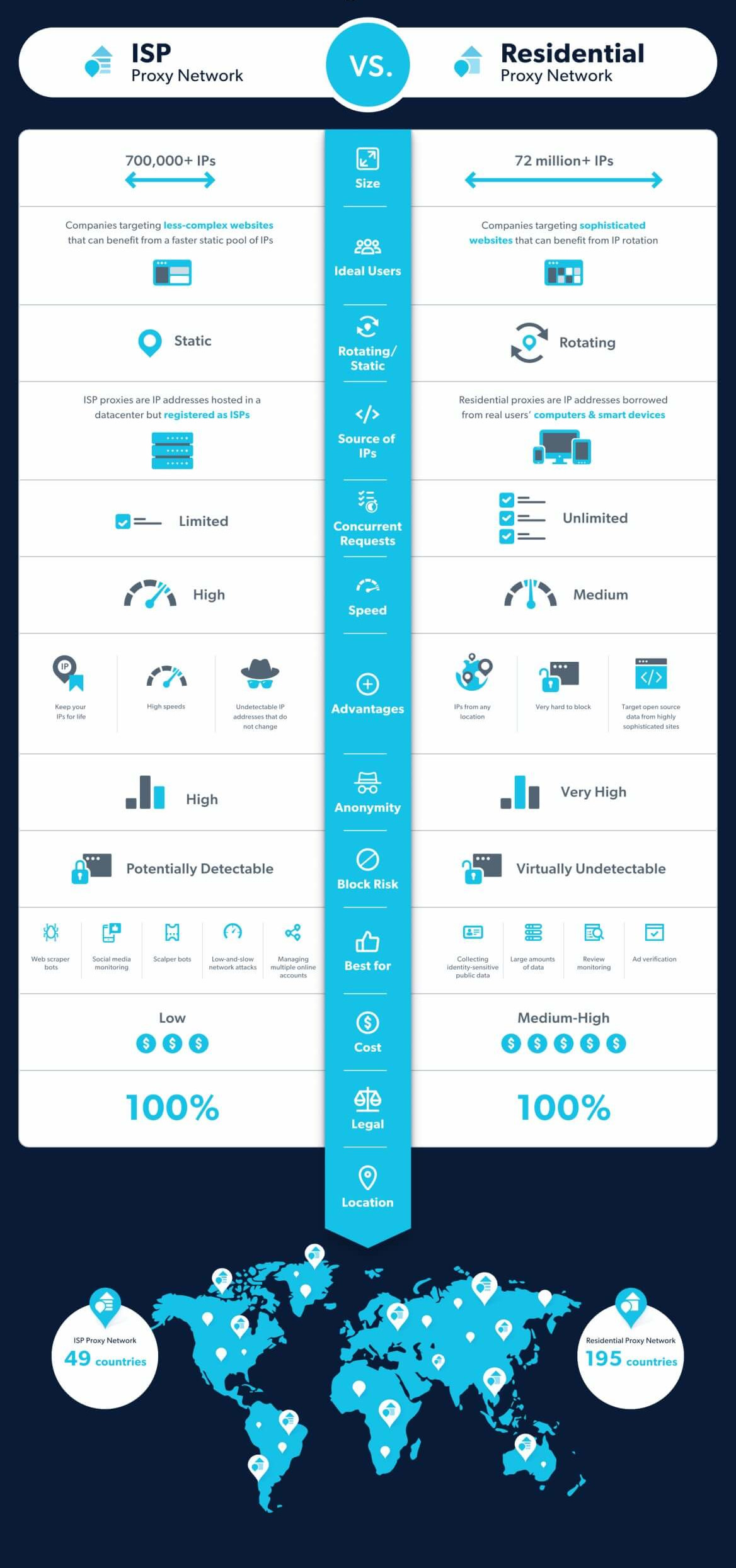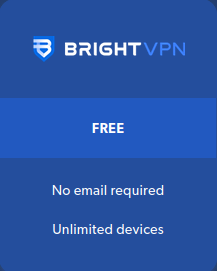What are ISP proxies?
These are Static Residential Proxies that are bought or leased from Internet service providers (ISPs). These IPs are hosted by servers located in Data Centers but are identified by target sites as real users. Since requests are routed through a Data Center, there are fewer ‘hops’ on the request journey meaning data collection jobs can be completed quicker than the industry average. On the other hand, ISP proxies are able to handle fewer concurrent requests and can deal with target sites that have easy to moderate blocking mechanisms and site architecture complexity.
What are Residential proxies?
Residential proxy IPs, on the other hand, consists of a global network of real peers that have opted into the network in exchange for some sort of remuneration (e.g., a free premium membership to an application). Since Residential data requests are routed through real devices, data retrieval times may be a bit slower. But on a positive note, they almost never get blocked, even when attempting to scrape highly sophisticated open-source sites. Information retrieved is almost always accurate based on the GEO, device, or Operating System (OS) of the user’s choice.
This truism is derived from the fact that data requests are routed through real, local user devices (e.g., a London-based school teacher who has opted in her home computer). Also, the sheer size of the network, as a function of peers (or network participants), means that one can send almost an unlimited amount of concurrent requests.

ISP Proxies vs. Residential Proxies
Which proxy network is most suitable for your business?
Companies chose to buy proxy IPs based on their suitability to their specific needs and use case. Here are a few examples of how other businesses are currently utilizing these networks. Use this as a guide in order to make the best decision for your team:
Common ISP proxy use cases
Company #1: Fintech insights
This business uses ISP proxy networks in order to appear on target site radars as real users from different geolocations -. Their aim is to collect open source data from their competitive landscape, including ‘rates’ and ‘pricing’ information from other money transfer applications. This enables them to create better-informed competitive market analyses, insights, and offer strategic plans based in real-time industry trends.
Company #2: eCommerce account management and advertising
Many companies in the digital commerce space utilize ISP proxies in order to:
- Run social media ad campaigns for their online retail sites
- Mange vendor accounts located in different geolocations
- Operate multi-login for eCom vendor accounts for businesses who have both employees and Points of Sale (PoS) spanning over two or more countries.
Common Residential proxy use cases
Company #1: Ad link verification
This company is a SaaS (Software as a Service)-based business in the ad network space. They utilize Residential proxies in order to test their customer’s advertisement links, ensuring that the link is being displayed to end-users is as intended by the campaign manager.
Company #2: SEO/eCommerce
The customer is an Amazon seller who utilizes Residential IPs in order to fully access the marketplace in order to conduct market research regarding various products’ prices, rankings, and reviews, as well as checking buyers’ searches for products, which keywords are used, etc..In order to create product catalog and item listing optimizations.
Company #3: Medical industry/Retail backend
This is a prescription intelligence platform that works to help both consumers and pharmacists alike. They need/utilize Residential IPs for their open-source web scrapers in order to gather competitive medical pricing intelligence.
Top-5 ISP proxy network Vs. Residential proxy network questions answered
For your convenience, here is a chart to help easily summarize key ISP and Residential proxy network differences mentioned in the previous section:
| Questions that businesses are asking: | ISP Proxies | Residential Proxies |
| What is the device/IP source for this network? | Residential IPs leased for commercial use | Real user devices |
| How do costs compare generally speaking? | This is the more cost-efficient option | This is, the pricier option |
| Which use cases is this network good for? | Companies looking to retrieve data from less-complex target sites that can benefit from a more static pool of IPs. | Companies looking to target sophisticated target sites that can benefit from IP rotation. |
| Which proxy network is better for an increased number of concurrent requests? | The quantity of concurrent requests is limited, especially when using a shared pool of IPs. | Send an unlimited amount of concurrent requests. |
| What unique advantages does each network type have? | Requests have less hops meaning data jobs can be retrieved quicker while still having target sites treat requests as originating from real users. | Being able to target, and access open source information from highly sophisticated sites while returning highly accurate user-facing data-points |
Additional tools to consider using
If you are looking for a simple account management tool that gives you live updates regarding performance, you may do well using a ‘Proxi API’.
For professionals looking to perform more manual, one-off tasks such as ad placement/content verification for a specific campaign, you may be well suited using the proxy extension for Chrome.
The bottom line
When approaching the issue of ‘Which proxy network best suits my business needs?’ Try going over the above chart and put a ‘V’ next to the capabilities/characteristics that are most important to you. Choose a maximum of 5 in total and choose the network that has a clear majority, i.e., 3 out of 5, for example, 1. Quick, 2.Cost-efficient, 3. Targeting less complex target sites means that ISP proxies are the way for you. If, however, you tick off: 1. Price is not a factor, 2. Consumer-facing data is a top priority, 3. The ability to send an unlimited number of concurrent requests is non-negotiable, then ‘Residential’ is your ‘golden boy’, so to speak.

Thank you for your sharing. I am worried that I lack creative ideas. It is your article that makes me full of hope. Thank you. But, I have a question, can you help me?